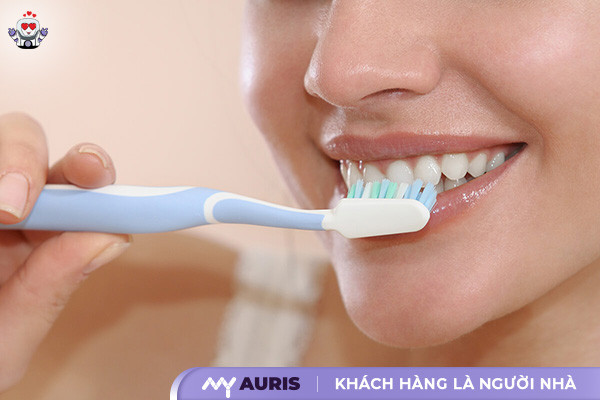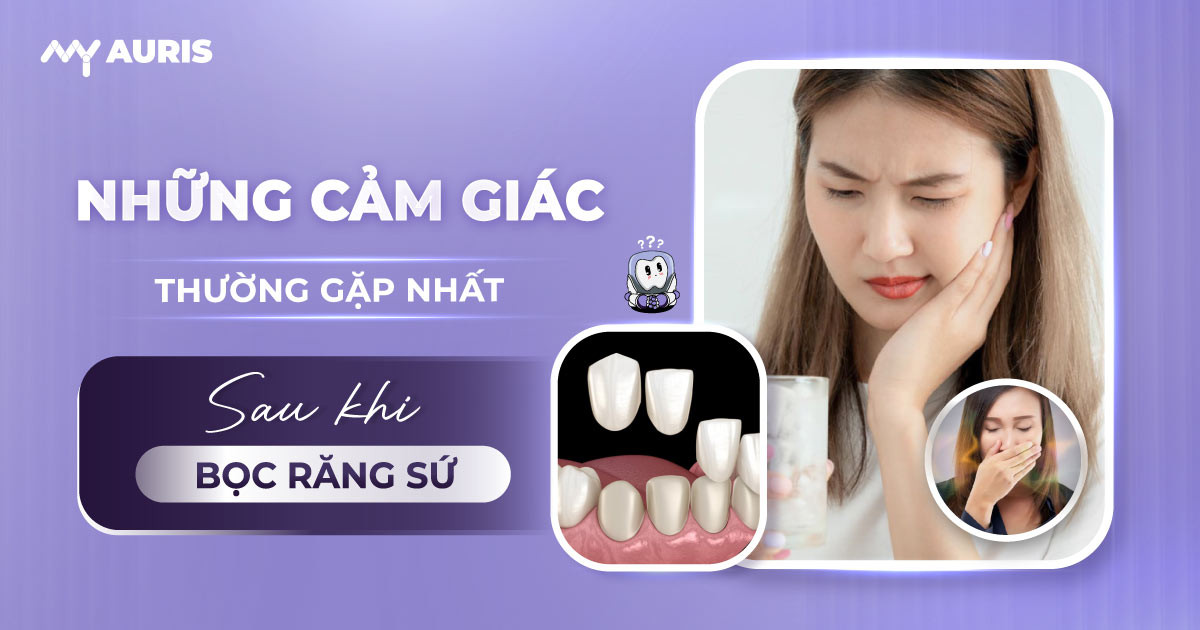Normal feeling after attaching porcelain teeth: Don’t worry!
Porcelain crowns are a method Popular dental restorations help improve oral health, aesthetics and chewing function. However, after this dental treatment, patients often experience some new sensations in the mouth area. Most are normal and will go away on their own after a short time. This article will help you better understand the normal feelings after attaching porcelain teeth:
The gum line (gum) changes color
After attaching a crown, bridge or dental implant, the border Gums around porcelain teeth may change color slightly. This is a normal symptom due to the gum tissue reacting to the porcelain tooth material. The color of porcelain teeth may change slightly, blending with real tooth color over time. The degree of color change depends on the location, type of porcelain tooth and each patient’s constitution. This phenomenon usually subsides and stabilizes after a few weeks. If inflammation, swelling or discoloration persists, accompanied by pain, discomfort or bad breath, you need to contact your dentist for timely examination and treatment. Proper oral care, using dental floss and mouthwash according to your doctor’s instructions will help minimize complications and maintain oral health.

Soreness Sensitivity and mild pain at the location where porcelain teeth are attached
Sensitivity and mild pain are quite common problems after porcelain crowns. The cause may be due to irritation of the tooth pulp during the tooth grinding process, or because the porcelain tooth does not completely fit the tooth position. This feeling often appears after porcelain teeth are attached and gradually decreases over time. If the pain level increases, persists or is accompanied by other unusual symptoms such as strange sounds when biting, numbness, difficulty breathing or allergic reactions, you need to go to a dental hospital to be examined and treated by a dentist. Care after porcelain crowns is very important, helping to minimize complications and maintain health, aesthetics as well as chewing function.

Slight itching in the gums
Slight itching in the gums after porcelain teeth are attached is also a normal symptom. The cause is usually because the gums are adapting to the new porcelain tooth material. This feeling is usually mild and disappears on its own after a few days. However, if the itching persists, long, accompanied by swelling, redness, pain or other unusual symptoms, you need to contact your dentist.
Warning: Abnormal signs after porcelain crowns
Porcelain dental crowns, a popular tooth restoration method in cosmetic dentistry, help improve oral health and smile aesthetics. However, after this dental treatment, some symptoms may appear. It is important for patients to distinguish between normal sensations and abnormal signs to promptly handle them and avoid complications dental health after porcelain crowns.
Eating and chewing, the feeling of teeth being rough, cracked, falling out
After porcelain crowns, the feeling Mild lumps and bumps sometimes appear. This may be a normal reaction of the body during the first time getting used to a new crown, bridge or dental implant. However, if this feeling lasts, increases or is accompanied by a feeling of loose or falling teeth, the cause may be due to a misaligned crown, a misaligned dental bridge, or a problem with the dental implant If you hesitate, contact a reputable dentist or dental hospital to have it checked and treated by a dentist.
Red, even pus-filled gums
Healthy gums are foundation for durable porcelain teeth. After dental implants, the gums may be slightly red for a short period of time. However, if the gums are dark red, swollen, painful, or even pus-filled, this is a sign of serious infection, which can be caused by poor oral hygiene, gum irritation, or complications after porcelain crowns. This affects your health, aesthetics, and chewing function Correct oral hygiene and compliance with your doctor’s follow-up schedule are important factors in maintaining the health of your gums and porcelain teeth.

Teeth are sensitive
Sensitivity after porcelain crowns is a problem many patients encountermay vary depending on the location, type of porcelain tooth and each person’s constitution. In some cases, tooth sensitivity to hot, cold or sweet foods is a temporary phenomenon. However, if this feeling persists, becomes increasingly uncomfortable, and is accompanied by pain, you need to see a dentist. Sensitive teeth can have many causes, including worn enamel, pulp inflammation, or a poorly fitting crown. Your dentist will determine the cause and provide appropriate treatment to protect your teeth and minimize discomfort.

Unusual bad breath
Bad breath after porcelain crowns is an abnormal sign, warning of oral health problems. The cause may be improper oral hygiene, food trapped under the crown, or infection. Bad breath not only affects psychology and communication but is also a symptom of dental diseases. To overcome this situation, you need to pay attention to oral care, use dental floss, mouthwash, and go to the dentist for regular checkups. Your dentist will help you remove plaque and bacteria that cause bad breath and ensure the best oral health.
Preventing Complications After Porcelain Crowns: Protecting Your Smile Bright
Ceramic crowns bring a confident smile, but complications after restoration can cause pain, discomfort, and affect oral health. This article shows how to prevent complications, protect your smile and health.
Choosing a Reputable Dentistry: The First Step to Healthy Teeth
Choosing a reputable dentist is key to the success of dental treatment, especially porcelain crowns. Reputable dentistry ensures quality dental restorations, minimizing complications.
- Learn more: Find out information about dentistry through websites, social networks, and patient reviews. Pay attention to the dentist’s experience, equipment, and practice certificates.
- Consult: Ask friends and relatives who have had porcelain teeth. Advice from experienced people helps you make informed decisions.
- Go directly to the dentist: Observe the facilities, hygiene, and how to serve patients. Talk directly with the dentist to evaluate expertise and answer questions about the porcelain crown process, costs, and types of porcelain teeth.
Reputable dentistry means experienced dentists, modern equipment, standard treatment procedures, and quality materials. This helps minimize complications after porcelain crowns such as gingivitis, bad breath, pain, discomfort, and changes in the color of porcelain teeth. Investing time to learn thoroughly is the first step to healthy teeth and a bright smile.

Comply with the Follow-up Examination Schedule: Maintain Long-Term Oral Health
Regular follow-up examinations after porcelain crowns are an important factor in maintaining health teeth, early detection of problems after porcelain crowns.
- Remember the appointment: Always remember the follow-up schedule set by the doctor. This helps the dentist monitor the condition of teeth and gums and detect abnormal symptoms early.
- Follow the instructions:Seriously follow the dentist’s instructions on porcelain tooth care and oral hygiene. This helps maintain long-term health, aesthetics, and function of porcelain teeth.
Regular re-examination helps prevent complications and handle them promptly. problems that arise. This is an effective way to protect the patient’s health, aesthetics, function, psychology, and economics.

Thorough Oral Hygiene: The Key to a Bright Smile
Thorough oral hygiene is the key to maintaining oral health, preventing complications after porcelain crowns. Proper oral care helps you be confident with a radiant smile.
- Brush your teeth properly: Brush your teeth at least twice a day, after each meal. 400;” aria-level=”1″>Use dental floss: Use dental floss to clean between teeth, remove plaque and leftover food. This helps prevent gingivitis, bad breath, and problems after porcelain crowns.
- Rinse mouthwash: Rinse your mouth with antibacterial mouthwash after brushing your teeth, helping clean your mouth and prevent disease-causing bacteria.
Proper oral care helps remove plaque, bacteria, prevent inflammation, bad breath, and unpleasant symptoms. This helps prolong the life of porcelain teeth, protecting oral health. bring a confident smile. Don’t forget, good oral care is the foundation for good oral health.





